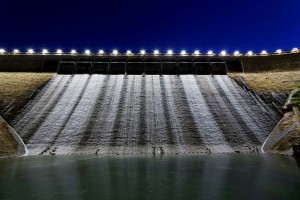
Water resource engineers design and manage the systems that deliver clean water to communities and treat wastewater. This civil engineering specialization requires a bachelor's degree in civil or environmental engineering, state licensure (PE), and typically 4-8 years of combined education and experience. Water resource engineers earn a median salary of approximately $92,060 annually, with steady employment growth projected through 2034 driven by infrastructure needs and water management challenges.
Every time you turn on a tap, flush a toilet, or fill a water bottle, you're benefiting from the work of water resource engineers. These professionals design and oversee the systems that deliver clean water to your home and safely handle wastewater-critical infrastructure most people never think about until something goes wrong.
Water resource engineering is a specialized branch of civil engineering focused on managing one of our most essential resources. It's challenging work that combines technical expertise with real-world problem-solving, and it's becoming increasingly vital as communities face aging infrastructure, population growth, and climate-related water challenges.
What Does a Water Resource Engineer Do?
Water resource engineers create the systems that manage human water resources. This includes water treatment facilities, underground wells, natural springs, stormwater management systems, and wastewater treatment plants. Think of them as the architects of our water infrastructure-they're the reason you can safely drink tap water and take a shower without worrying about contamination.
The work involves several key responsibilities. Engineers analyze data from water systems to identify problems or inefficiencies. They design new facilities or upgrade existing infrastructure, taking into account budgetary constraints, government regulations, environmental impacts, and community needs. Many engineers then oversee the construction of their designs, ensuring contractors build everything correctly. After completion, they often manage ongoing maintenance and monitoring to keep systems running smoothly.
A Typical Day
Here's what a typical day might look like for a water resource engineer. You'll start your morning reviewing data from monitoring stations-flow rates, water quality readings, and pressure levels. If something's off, you'll investigate why. Mid-morning might involve a team meeting with city planners to discuss a proposed development that'll impact water demand. After lunch, you're reviewing construction drawings for a new pump station, marking up changes and checking calculations.
Tuesday afternoon, you're at a construction site wearing your hard hat, walking through a water main replacement project with contractors. You're checking that pipe joints are sealed correctly and that everything matches the specifications. Back at the office, you'll spend the last hour updating project reports and responding to emails from state environmental regulators about permit requirements.
It's not the same every day-that's part of what makes the work interesting. One week you're deep in hydraulic modeling software, the next you're presenting designs to a city council, and the week after that you're troubleshooting why a treatment plant isn't meeting discharge standards.
Where Does a Water Resource Engineer Work?
Most water resource engineers split their time between office and field work. You'll spend about 60-70% of your time in an office environment, working on designs, analyzing data, running computer models, and coordinating with teams. The rest of your time is spent at construction sites, treatment facilities, or out in the field checking on existing infrastructure.
The office work involves computer-aided design (CAD) software, hydraulic modeling software, and extensive data analysis. You'll attend meetings with clients, contractors, and regulatory agencies. Fieldwork means wearing boots and a hard hat, walking construction sites in all weather, and sometimes climbing into treatment plants or pump stations to inspect equipment. It's hands-on work that gets you away from your desk.
Some water resource engineers choose to travel internationally to work on large infrastructure projects in developing countries. These assignments can last from a few months to a year or more, helping communities establish clean water systems where none existed before.
Expect to work full-time, often more than 40 hours per week. When you're managing a significant project or dealing with a system failure, long hours are standard. The industry has busy seasons-construction often occurs in warmer months, so spring through fall can be particularly demanding.
What Is the Average Water Resource Engineer Salary?
Water resource engineers, closely related to the hydrologist occupation tracked by the Bureau of Labor Statistics, earn a median annual salary of $92,060 as of 2024. The lowest 10% earn around $56,000, while the top 10% make more than $146,000.
Your earning potential depends on several factors. Here's how salary typically progresses:
| Experience Level | Years | Typical Salary Range | Key Factors |
|---|---|---|---|
| Entry-Level | 0-2 years | $56,000-$70,000 | Bachelor's degree, EIT certification, limited project experience |
| Mid-Career | 3-7 years | $75,000-$100,000 | PE license, managing smaller projects, specialized skills |
| Senior-Level | 8+ years | $105,000-$146,000+ | PE license, managing major projects, team leadership, Master's degree |
Geography makes a difference, too. Water resource engineers in California, Texas, and the Northeast typically earn 10-20% more than the national median due to higher costs of living and greater infrastructure demands. Engineers working in consulting firms often earn more than those in government positions, but government jobs typically offer better benefits and work-life balance.
Education level impacts your earnings. While you can start your career with a bachelor's degree, engineers with master's degrees earn up to ~13% more on average. A Master's degree also opens doors to specialized positions and management roles that aren't typically available to bachelor's-level engineers.
Professional licensure matters. Once you earn your PE (Professional Engineer) license, you'll see a salary bump of typically $5,000-$15,000. Licensed engineers can stamp and approve designs or sign off on plans, which makes you far more valuable to employers and opens up more career opportunities.
What Is the Job Demand for Water Resource Engineers?
The job outlook for water resource engineers is steady and stable. The Bureau of Labor Statistics projects employment in related water engineering fields will remain flat but grow faster than average for all occupations between 2024 and 2034, with approximately 400 new positions expected nationwide. While this represents stable rather than explosive growth, demand remains consistent due to ongoing infrastructure needs.
Several factors sustain this demand. Infrastructure is aging-many of our water systems were built 50-100 years ago and desperately need repair or replacement. Communities can't afford to let water systems fail, so they're investing heavily in infrastructure upgrades. Population growth puts continuous strain on existing water resources, requiring new systems and expanded capacity. Climate change is creating new challenges, too, from droughts that require better water-conservation systems to increased flooding that demands improved stormwater management.
We're also seeing tighter environmental regulations around water quality and treatment standards. Communities need engineers who understand both the technical requirements and the regulatory landscape. The combination of these factors means consistent, reliable demand for qualified water resource engineers even in a flat employment market.
Career Advancement Opportunities
Your career path can take several directions. Many engineers start as junior project engineers, assisting senior engineers with design work and site visits. After earning your PE license and gaining 5-7 years of experience, you can move into project management, where you're responsible for entire projects from conception to completion. Senior engineers often oversee multiple projects and mentor younger staff.
From there, you might move into management as a department head or vice president at a consulting firm, or become a chief engineer for a municipal water district. Some engineers specialize in particular areas-such as stormwater management, water treatment plant design, or hydraulic modeling-and become recognized experts in their niche. Others transition into regulatory roles with state environmental agencies or move into academia to teach the next generation of engineers.
Related Career Paths
If you're interested in water resource engineering, you might also consider these related careers. Water quality specialists focus specifically on testing and monitoring water to ensure it meets safety standards-less design work, more laboratory analysis and field sampling. Watershed managers take a broader ecological approach, managing entire watersheds to protect water resources through conservation and land use planning. Environmental engineers work on a wide range of environmental problems beyond water, including air quality, waste management, and soil contamination. Hydrologists study the movement, distribution, and quality of water throughout the earth's system, focusing more on the science than the engineering applications.
These careers all involve water in some way, but each has a different focus and requires slightly different skills and education.
What Are the Education Requirements to Become a Water Resource Engineer?
You'll need at least a bachelor's degree to work as a water resource engineer. Most engineers earn degrees in civil engineering with a concentration in water resources or in environmental engineering. The degree typically takes four years to complete and includes coursework in hydraulics, hydrology, fluid mechanics, water treatment processes, environmental chemistry, and engineering design.
Program accreditation matters. Many states require that you graduate from an ABET-accredited program to qualify for licensure. ABET (Accreditation Board for Engineering and Technology) ensures that engineering programs meet quality standards and prepare students for professional practice. Before choosing a school, verify that it's ABET-accredited.
The Path to Professional Licensure
Licensure is essential for career advancement. All U.S. states require licensure to approve engineering designs or sign off on plans, which means you'll need it to progress beyond entry-level positions. Here's the typical path:
Step 1: Pass the Fundamentals of Engineering (FE) Exam. Most students take this exam during their senior year of college or shortly after graduation. It's a comprehensive test covering math, science, and engineering fundamentals. Passing this exam makes you an Engineer-in-Training (EIT) or Engineer Intern (EI).
Step 2: Gain work experience. You'll need four years of progressive engineering experience working under a licensed Professional Engineer. During this time, you're building your skills, taking on more responsibility, and learning the practical aspects of the profession that weren't covered in school.
Step 3: Pass the Principles and Practice of Engineering (PE) Exam. After completing your four years of experience, you're eligible to take the PE exam in civil or environmental engineering. This is a more advanced test that evaluates your ability to practice engineering safely and competently. Pass this exam, and you become a licensed Professional Engineer (PE).
The timeline from graduation to PE license is typically 4-5 years if you follow this path without interruption.
Graduate Education
Roughly 20-25% of civil engineers hold a master's degree, and there are good reasons to consider it. A Master's degree in water resources engineering or environmental engineering deepens your technical knowledge, particularly in specialized areas like advanced hydraulic modeling, watershed management, or water treatment technologies. It also increases your hiring prospects and salary potential.
Many engineers work full-time while earning their master's part-time through evening or online programs. This approach takes 2-3 years but lets you gain experience while advancing your education. Some employers will even pay for part or all of your graduate education.
You don't need a master's to have a successful career, but it's almost essential if you want to move into senior technical positions, management roles, or specialized consulting work. It also makes you a stronger candidate for positions with major consulting firms and federal agencies.
Essential Skills for Water Resource Engineers
Technical knowledge is just the starting point. Here are the skills that separate water resource engineers from great ones:
Technical Skills: You'll need proficiency in CAD software (AutoCAD Civil 3D, which is the industry standard) and hydraulic modeling programs like HEC-RAS or EPANET. Understanding hydrology-how water moves through natural and built systems-is fundamental. You should be comfortable with engineering mathematics, particularly calculus and statistics. Knowledge of water treatment processes, environmental regulations, and construction methods is essential.
Problem-Solving: Water systems are complex, and problems rarely have obvious solutions. You need to analyze situations from multiple angles, consider various constraints (budget, regulations, physical limitations, community needs), and develop creative solutions that actually work in the real world.
Communication: You'll write reports that non-engineers need to understand. You'll present designs to city councils and community groups who want to know what you're building in their neighborhood and why it costs so much. You'll explain technical issues to contractors and make sure they understand what needs to happen on-site. If you can't communicate clearly, your brilliant designs won't matter.
Project Management: As you advance in your career, you'll juggle multiple projects with different deadlines, budgets, and stakeholders. You'll need to coordinate teams, manage budgets, track timelines, and keep everyone on the same page. Organization and attention to detail become critical.
Teamwork: Water resource engineering isn't a solo endeavor. You'll work with other engineers, technicians, contractors, government officials, and community members. Being able to collaborate effectively, resolve conflicts constructively, and build productive working relationships makes a massive difference in project success.
Frequently Asked Questions
What degree do I need to become a water resource engineer?
You need a bachelor's degree in civil engineering (with a water resources focus) or environmental engineering from an ABET-accredited program. This typically takes four years and includes coursework in hydraulics, hydrology, fluid mechanics, and water treatment. A master's degree isn't required to start your career, but it becomes valuable for advancement into specialized or management positions.
How long does it take to get licensed as a water resource engineer?
The full path to Professional Engineer (PE) licensure typically takes 4-5 years after graduation. You'll take the Fundamentals of Engineering (FE) exam during or shortly after college, then work for four years under a licensed PE to gain experience, and finally pass the PE exam. Some states have slightly different requirements, so check your state's engineering board for specifics.
What's the difference between a water resource engineer and a civil engineer?
Water resource engineering is a specialization within civil engineering. All water resource engineers are civil engineers, but not all civil engineers work in water resources. While civil engineers might design roads, bridges, buildings, and other infrastructure, water resource engineers focus specifically on water-related systems, including water supply, treatment, distribution, stormwater management, and wastewater handling. The education is similar, but water resource engineers take additional specialized coursework in hydrology and water treatment.
Do water resource engineers work outdoors?
Yes, but it's typically about 30-40% of the job. Most of your time (60-70%) is spent in an office working on designs, analyzing data, and managing projects. The outdoor work includes visiting construction sites to oversee projects, inspecting existing infrastructure, taking water samples, and attending site meetings. You'll need appropriate fieldwork gear-boots, a hard hat, and a safety vest-and should be prepared to work in various weather conditions.
Is a Master's degree required for water resource engineering?
No, a Master's degree isn't required to start your career or obtain licensure. However, roughly 20-25% of civil engineers hold graduate degrees, and there are real benefits to this. A Master's can increase your salary up to ~13% and open doors to specialized technical positions and management roles. Many engineers earn their Master's degree part-time while working, often with employer support. It's not mandatory, but it's a strategic investment if you're aiming for senior-level positions.
Key Takeaways
- Career Pathway: Water resource engineers design and manage clean water and wastewater systems, requiring a bachelor's degree in civil or environmental engineering from an ABET-accredited program plus state licensure (PE), typically achievable 4-5 years after graduation through progressive experience and exam passage.
- Competitive Compensation: Water resource engineers earn a median salary of $92,060 annually as of 2024, with entry-level positions starting around $56,000-$70,000 and senior engineers earning $105,000-$146,000+ depending on experience, licensure (adding typically $5,000-$15,000), education level (Master's adds up to ~13%), and geographic location.
- Steady Job Market: The field maintains stable employment with flat but consistent growth through 2034, adding approximately 400 positions nationwide, driven by aging infrastructure requiring replacement, population growth demanding expanded capacity, climate challenges necessitating improved water management, and stricter environmental regulations around water quality standards.
- Balanced Work Environment: Engineers spend 60-70% of their time in office settings working on designs, data analysis, and modeling software, with the remaining 30-40% at construction sites and facilities conducting inspections, overseeing projects, and fieldwork-often exceeding 40 hours weekly during busy project phases.
- Critical Skill Mix: Success requires technical proficiency in CAD and hydraulic modeling software, strong communication skills for presenting to stakeholders, project management abilities to coordinate teams and budgets, and problem-solving capabilities to navigate complex regulatory and engineering challenges.
Ready to launch your water resource engineering career? Explore ABET-accredited civil and environmental engineering programs that can set you on the path to designing the water systems that communities depend on every day.
Professional Organizations and Resources for Water Resource Engineers
Connecting with professional organizations helps you stay current with industry developments, access continuing education, and network with other professionals. Here are valuable resources for water resource engineers and those aspiring to enter the field:
Government Resources
Water Laws & Regulations From the U.S. Environmental Protection Agency (EPA) - The EPA establishes and enforces federal water quality standards and regulations. Water resource engineers must thoroughly understand these requirements, as all designs must comply with EPA regulations. This site provides current information on the Clean Water Act, Safe Drinking Water Act, and related federal standards that govern your work.
Professional Organizations
American Academy of Water Resource Engineers (AAWRE) - A specialized organization dedicated to advancing water resource engineering practice and ethics. They offer the Diplomate Water Resource Engineer (D.WRE) certification, which is a recognized advanced credential that demonstrates specialized expertise beyond the PE license. The organization provides continuing education programs, technical publications, and networking opportunities specifically for water resource engineers.
American Society of Civil Engineers (ASCE) - As the premier professional organization for civil engineers across all disciplines, ASCE offers extensive resources valuable to water resource engineers. Membership provides access to technical conferences, professional development courses, industry publications, including the Journal of Hydraulic Engineering, and local chapter meetings for networking. ASCE also advocates for infrastructure investment and provides career development resources at all experience levels.
Additional Resources
- National Ocean Service - Provides data and research on coastal and ocean water resources, which are valuable to engineers working on coastal infrastructure projects.
- American Water Resources Association - Offers multidisciplinary perspectives on water resource management, bringing together engineers, scientists, planners, and managers to address water challenges.
Degrees Related to Water Resource Engineering
2024 US Bureau of Labor Statistics salary and job growth figures for hydrologists reflect national data, not school-specific information. Conditions in your area may vary. Data accessed January 2026.













